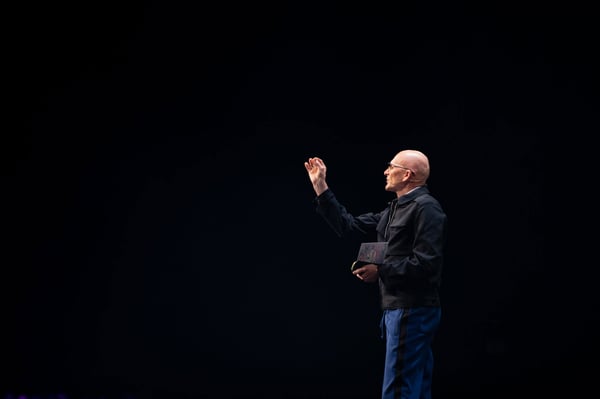Dr. Kjell Nordstöm predicts the future and how the forces of capitalism, urbanization, and digitalization will shake up the world. Everything that can be digitized will be digitized; maybe even college degrees. If that's the case, how will we make money?
Not only has he been ranked as Europe’s number one strategic thinker, but Kjell Nordström’s best-seller, Funky Business has been translated into 33 languages and is rated as one of the five best business books in the year 2000 by Amazon.
“Making money is 50 percent art and 50 percent science. Successful companies are the ones that are providing answers to questions that life has posed us,” says Nordström as he captivates his audience at Oslo Business forum like a true magician.
According to him, successful companies constantly work hard to find these answers which are rapidly changing due to the environment we live in. For companies to find new answers, they must continue analyzing the environment.
- Want to listen to Kjell Nordström and more world-class speakers? Click here to gain exclusive access to all the presentations
Are the Nordics rich and Successful Because of Oil?
There are two predominant reasons why the Nordic countries have succeeded and are global frontrunners in terms of economic and social growth:
-
Super high trust societies - which reduce costs and increase efficiency.
-
Ultra-modern societies - they find solutions to simple problems 5-7 years before the rest of the world.
He asserts that it is not oil and gas but trust and modernity that is key to the Nordics success and this is the reason why many countries rich in natural resources have not managed to achieve sustainable growth.
When asked how developing countries can achieve economic and social progress, he says that corruption has been a challenge for many countries. It has replaced meritocracy and led to institutional failures. This challenge will have to be addressed to restore trust and give way to modernity, leading to success.
According to Nordström, the world we live in today is like a matrix, surrounded by three extremely powerful forces that run our lives and the implications of these forces need to be considered for money making:
1. One Planet, One System
Capitalism is a useful machine that sorts out everything in two piles: the efficient and the inefficient. Moreover, he states that capitalism is the common language for communication across the world. Pakistan, Sierra Leone or France can all speak to each other in this language.
2. From 200 Countries to 600 Cities
We are in the beginning of the fastest urbanization process documented in history and this will transform the planet from 200 countries to 600 cities. These 600 cities or urban centers will account for 80-85 percent of the world’s population and for 90-95 percent of the world's GDP within the next 30 years. The Nordic capitals are at the forefront of this process.
3. Digitizing Everything
"Anything that can be digitized will be digitized and copied!” says Nordstrom. Consider the economies of scale and accessibility of this force, they are gigantic.

How to Make Money in a Rapidly Changing World?
Bringing it all together, Nordström asserts that any money making starts with a good idea, an idea which is simple yet powerful: a temporary monopoly. Only temporary monopolies will make money, he claims. “But where can we find temporary monopolies in this fast-changing digitized business climate?” and the answer lies in the type of knowledge: articulate vs. tacit.
Articulate knowledge is information that can and has been digitized and tacit knowledge is all that what we know but cannot say, it is merely implied. Digitized articulate knowledge is where robot and man can work side by side whereas it is tacit knowledge that will create space for temporary monopolies.
He says the answer lies in us, as we know more than we can say. Temporary monopolies will be created out of what we cannot say but only understand. And in order to avoid being just a “one-hit wonder” companies will need to maintain the monopolistic edge by transforming either by innovating or by buying innovation. “Keep looking for the answers” advised the futurist.
Are you interested in reading more from the conference, Digital Leadership? If so, we recommend you to dig into these three articles:
- Nancy Giordano: The future of leadership – Invest in curiosity and trust
- Kate Darling: How robots will provide comfort and make space for better jobs
- Hilde Tonne: How doing business right will change the world